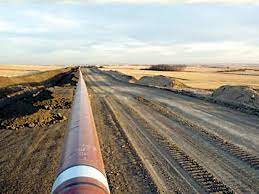Islamabad December 29 2021: Prime Minister Imran Khan chaired a high level meeting to review gas situation in Pakistan. The Prime Minister while emphasizing the importance of North-South Gas Pipeline, directed to ensure its execution without further delay in the agreed timelines.
North South Gas Pipeline (NSGPP) of 1,122 kilometers from Port Qasim (Karachi) to Kasur (Punjab) that will increase the capacity of the country to transport the imported gas from the port city to load center of Punjab.
A L S O || R E A D
The cost of the Pakistan Stream Gas Pipeline has been estimated at USD 2.25 billion, which is yet to be finalized after input from Russian experts. The country’s existing system has the capacity to import and transport RLNG of 1.2 billion cubic feet.
Under the new scenario that emerged out of Aug 13, 2020 Supreme Court judgment, the Petroleum Division will have maximum liquidity. The Finance Division has over PKR 302 billion collected in the head of Gas Infrastructure Development Cess (GIDC) whereas the government entities will have to collect over PKR 517 billion from various sectors of economy in 24 installments. The Petroleum Division will invest in the project from the GIDC funds for the construction of North South Gas Pipeline.
The meeting was briefed about the demand, supply from the domestic reserves, shortfall and Import of LNG. It was informed that the current constrained demand of gas in the country is 4700 MMCFD which increases to 6000-6500 MMCFD during the winter season. The current domestic supply amounts to 3300 MMCFD which is decreasing every year. The resulting shortfall has to be managed by importing LNG. With the current infrastructure a shortfall of nearly 1000 MMCFD in winters arises for which multiple options are being adopted.
For short term, the existing capacity of domestic terminals is being optimized and the process of issuance of virtual pipeline licenses is expedited. In addition, the installation of two new LNG Terminals is underway with all bottlenecks being removed on priority basis.
Pakistan is a highly gas deficit country. The local gas production has drastically dwindled to 3.2 bcfd from 4.2 bcfd and to meet the increasing deficit of 2.5 bcfd, the country is importing LNG of 1-1.2 bcfd, depending upon the needs of the country. In the winter season, the country’s demand increases manifold up to over 6 bcfd, which is not being met by local gas and imported LNG. Pakistan currently can import LNG of 1.2 bcfd but when two more LNG terminals come on stream, the capacity of the country to import LNG will increase up to 2.4 bcfd, which will help meet the growing gas deficit of the country.
The Prime Minister directed to fast track the issuance of licenses for domestic exploration as it is the cheapest source of natural gas. He also directed the concerned departments to remove hurdles in the process of installation of new LNG terminals and virtual pipeline projects by investors.
In this regard Ministry of Maritime Affairs, Ministry of Petroleum and OGRA were directed to coordinate and also take all other stakeholders on board including the investors.
The meeting was attended by Federal Minister, Shaukat Fayyaz Tarin, Hammad Azhar, Asad Umar, Ali Haider Zaidi, SAPM Mahmood Maulvi and officials of the concerned departments.












